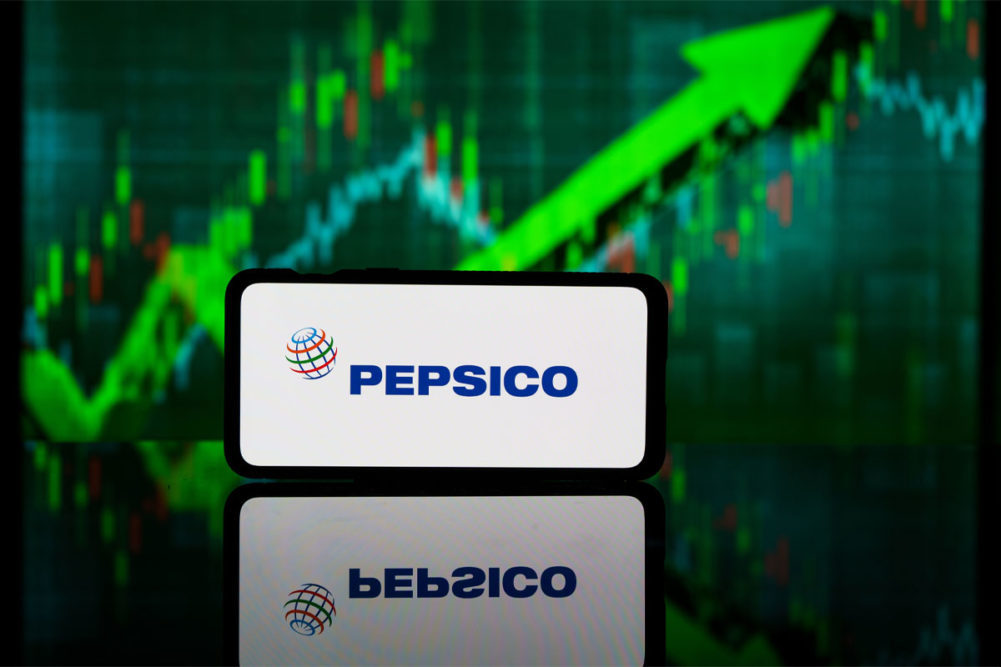NEW YORK — With shares of PepsiCo, Inc. trading at the lowest valuation in 22 years, Morgan Stanley is upgrading the investment rating of the Purchase, NY-based maker of snacks, beverages and food to overweight.
With the upgrade from equal-weight, PepsiCo becomes Morgan Stanley’s top pick among consumer packaged foods, replacing Constellation Brands and Colgate.
“We would be aggressive buyers here ahead of a powerful inflection in H2 (the second half of 2024) after PepsiCo bottoms fundamentals in Q1 (the first quarter) and returns to above consensus and peer organic sales growth (OSG),” said Dara Mohsenian, equity analyst.
The move by Morgan Stanley follows a downgrade last year. At the time, the investment bank voiced concern PepsiCo’s valuation was too high with the company’s shares “priced to perfection and consensus/PEP guidance on OSG was clearly too high with an unrealistic volume rebound as pricing dissipated.”
Together with most other packaged foods companies, PepsiCo shares have been under pressure for longer than a year, slumping 6% in 2023. From a peak of $196.88 per share in May 2023, the stock price fell 21% to a bottom of $155.83 in October and was trading in the low $160s most of 2024 before the Morgan Stanley upgrade. The stock surged $6.60 on March 18, after the rating change, to a close of $171.26. Morgan Stanley set a new price target for PepsiCo of $190.
Between the downgrade and the upgrade, Mohsenian said PepsiCo experienced setbacks in its financial picture, with a 170 basis point OSG miss in the fourth quarter, the company’s first OSG miss in seven years. OSG decelerated 980 basis points in 2023 between the first quarter of 2023 and the last, and management guided 2024 OSG downward.
Prefacing the factors prompting the upgrade, Mohsenian said, “In our view the market has significantly overreacted to real but way overblown either short-term issues at Pepsi, or manageable modest LT (long-term) headwinds.”
Encouraging investors to “look forward, not backward,” Mohsenian said PepsiCo is poised for a rebound.
“We believe OSG is about to clearly bottom in Q1 and rapidly inflect in the balance of the year back to slightly above consensus estimates, as well as relative to peers,” he said.
Mohsenian said PepsiCo in recent quarters had lost pricing power relative to peers because “unsustainable gaps” had opened. PepsiCo is expected to regain relative pricing power ahead.
“Said more simply, companies with pricing power have underperformed recently with a larger sequential slowdown in recent quarters as unsustainable industry pricing on higher commodities moderated, along with a below consensus volume rebound; this should shift back to appreciation of greater long-term pricing power going forward,” he said.
This expectation is based on PepsiCo’s strong position in the snacks and beverage categories, both of which face limited private label penetration, Morgan Stanley said.
Other positives cited include “a Quaker recall recovery, Middle East boycott issues dissipating, cycling lower SNAP benefits, and weather normalizing in US beverages.”
Mohsenian cautioned that a weak first quarter at PepsiCo is anticipated but that an inflection is around the corner.
“There is some risk we are a bit early here, GLP-1 risk is greater than we expect, NA (North America) trends stubbornly remain weak, or the market remains hesitant to re-value out-of-favor names,” he said.
Acknowledging that Frito-Lay North America volume has been soft, Mohsenian said the business’s underlying performance was “better than it appears,” both by long-term growth measures (versus 2019) and relative to peers.
“(We) are heartened that units held up better than volumes in 4Q amid a shift to smaller packages,” Mohsenian said. “We expect a shift back to larger packages this year as consumers seek value, which should benefit volumes going forward. Last, FLNA volumes should also see less of a negative impact to some extent beginning in March as they cycle last year’s reduction in SNAP benefits.”
Mohsenian pointed out fourth-quarter unit sales held up better than volume because of a shift to on-the-go (c-store) eating from in-home, with much smaller package sizes in the former channel. Similarly, he noted that volumes reported by FLNA were better than tracked channel scanner data over the past year. In the first quarter of 2024, FLNA volume through Feb. 24 was down only 0.6%, based on scanner data, versus a 3.2% decrease over the same period in 2023, Morgan Stanley said.
A recall at Quaker Foods, beginning in late 2023, is expected to severely affect that business in the first quarter with a smaller but still significant effect in the second.
A recall of granola bars/cereal due to salmonella contamination expanded in January to include additional branded cereals, bars and snacks. Mohsenian predicted QFNA profits may be down 70% in the first quarter and 50% in the second.
“The good news is this should inflect rapidly once Pepsi cycles over the issue,” Mohsenian said. “In general, topline has generally quickly recovered in past product recalls across CPG even with less retailer shelf support post incidents.”

